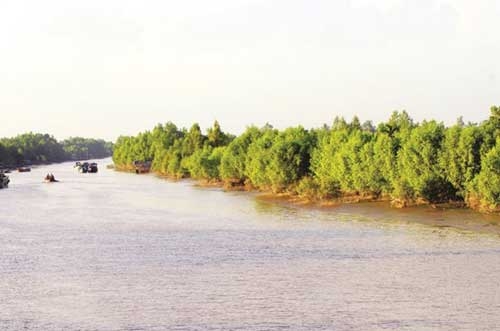Soc Trang highlights eco-tourism
 |
| Dung Islet, where there is an eco-resort on a salinity- intruded forest, an attraction in Soc Trang Province. |
The “eco-tourism” concept Soc Trang’s leaders aspire to formulate is that natural resources are in primitive condition while people who want to exploit the resources must be committed to protecting and enhancing the surrounding natural environment. In this context, minimum human impact on the environment is the first priority.
Potential
Soc Trang Province is endowed with untapped potentials and advantages for developing eco-tourism. The province is home to Tran De and Dinh An estuaries and the My Thanh River. Furthermore, the islets along the Hau (Bassac) River, including Dung, My Phuoc and Song Phung 3 can be counted as local valuable assets together with the 72-kilometer coastline.
The province’s network of islets stretches over 50 kilometers along the Hau River toward the East Sea. My Phuoc Islet Resort boasts local landscapes. To celebrate the annual Doan Ngo Festival (falling on the fifth day of the fifth lunar month), the province hosts the “Song nuoc miet vuon” (waterways in the countryside) festival. In addition to giving visitors an insight into the traditional local culture, the festival creates a chance of enjoying fresh local specialties, including fruits.
The event is held with a wide range of activities—for instance, a cooking contest, a fruit decoration competition, don ca tai tu (southern traditional amateur music) performances and folk games. Last but not least, local foods should be a feast worth being tried by tourists.
Tapping potential
To call for domestic and foreign investment in eco-tourism projects, Soc Trang has drawn up policies and incentives, especially those involving site clearance, land lease, infrastructure construction, administrative procedure consulting and funding, vocational training and technology transfer.
Projects calling for investment will provide detailed information for investors—bidding documents, locations, functional areas, land-use rights, power and water supply, to name just a few.
The provincial authorities are now focusing on potential investors for Ho Be eco-resort project in Vinh Chau Town and Song Phung eco-resort project in Long Phu District.
Earlier this year, several entrepreneurs showed their initial in these projects. The authorities are preparing to call for new investors in a hydrofoil port after the initial investor failed to realize it.
Definitely these projects’ operation will further the effort made by Soc Trang to foster local eco-tourism and make exclusive eco-tours combining pilgrimage, cultural festivals, craft villages and specialties. The effort will engage the province’s population in attracting more local and foreign tourists.
Sustainable eco-tourism development
Eco-tourism is closely related to natural resources, local culture, environmental education and community. In that sense, eco-tourism services should be provided in a way that minimizes negative impacts on bio-diversity. Protection of beaches, rivers and forests must be prioritized. In practical terms, it involves training for tourism workers; links between tourism organizations and associations, travel companies and localities; raising awareness of environmental protection in the community; and enhancing the role of tourism authorities at all levels.
LAND OF ISLES AND FESTIVALS
In addition to well-known tourist destinations such as Doi (bat) Pagoda, Dat Set (clay) Pagoda and Chen Kieu (porcelain bowl) Pagoda, Soc Trang is home to three peoples – Kinh, Khmer and Chinese – with many cultural festivals and religious rituals. The annual Ok Om Bok Festival and boat races attract thousands of tourists. Soc Trang also has rich supplies of fish. Furthermore, orchards on the islets along the Hau River yield delicious tropical fruits all year round.
What the stars mean:
★ Poor ★ ★ Promising ★★★ Good ★★★★ Very good ★★★★★ Exceptional
Latest News
More News
- Manila becomes a new check-in destination for Vietnamese youth (December 11, 2025 | 18:07)
- Vietjet launches mega year-end ticket promotion (December 10, 2025 | 11:33)
- Dalat leads Vietnam’s 2025 search trends (December 09, 2025 | 13:44)
- Vietnam welcomes record wave of international visitors (December 09, 2025 | 13:43)
- Vietjet launches daily Manila flights to celebrate year-end festive peak season (December 05, 2025 | 13:47)
- The destinations powering Vietnam’s festive season travel demand (December 04, 2025 | 18:33)
- Vietnam named among the world’s most exciting winter destinations (December 04, 2025 | 15:10)
- Phu Tho emerges as northern Vietnam’s new tourism hub (December 01, 2025 | 17:00)
- Vietjet completes Airbus A320/A321 updates ahead of deadline (December 01, 2025 | 09:49)
- Vietjet resumes Con Dao flights from early December (November 28, 2025 | 15:24)
















 Mobile Version
Mobile Version